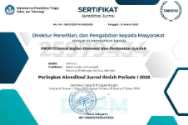Analysis of the Effect of Fiscal and Monetary Policy on Economic Growth in Indonesia Pre and Post Covid-19
(1) * Wartoyo Wartoyo


 (Prodi Ekonomi Syariah IAIN Syekh Nurjati Cirebon)
(Prodi Ekonomi Syariah IAIN Syekh Nurjati Cirebon) Indonesia
(2) Nur Haida (Prodi Ekonomi Syariah UI Bunga Bangsa Cirebon)
Indonesia
(3) Asni Komalasari (Prodi Ekonomi Syariah IAIN Cirebon)
Indonesia
(4) Alya Fauzi Zaizafun (Prodi Ekonomi Syariah IAIN Cirebon)
Indonesia
(*) Corresponding Author
AbstractAbstract This study aims to determine the influence of fiscal policy and monetary policy on economic growth in Indonesia in 2007-2022. The independent variables used in this study are categorized into two camps, namely the fiscal policy camp consisting of tax revenue (X1) and government expenditure (X2). Meanwhile, monetary policy consists of interest rates (X3) and money supply (X4). This research uses data series obtained from the Central Statistics Agency (BPS) and Bank Indonesia (BI). In this study using quantitative methods and using multiple linear regression analysis. The results showed that the variable of tax revenue (X1) has a positive and significant effect on economic growth, government spending (X2) has a negative and significant effect on economic growth in Indonesia and interest rates (X3) have a negative and insignificant effect on economic growth in Indonesia, while the money supply (M2) has a positive and significant effect on economic growth. Keywords: Fiscal Policy, Monetary Policy and Economic Growth. |
Keywords
Full Text: PDF
Refbacks
- There are currently no refbacks.
Copyright (c) 2024 Wartoyo Wartoyo, Nur Haida, Asni Komalasari, Alya Fauzi Zaizafun
This work is licensed under a Creative Commons Attribution-NonCommercial-ShareAlike 4.0 International License.
Published by Islamic Faculty of Nurul Jadid University, Probolinggo, East Java, Indonesia.





.jpg)



